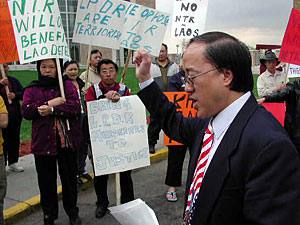|
Photos
Your Voice
|
U.S. ambassador to Laos gets earful over increased trade possibility
May 6, 2003
 |
| Stephan Vang, president of United Lao/Hmong Congress for Democracy addresses demonstrators opposing normal trade with Laos at Metro State University in St. Paul. (MPR Photo/Art Hughes) |
St. Paul, Minn. — The Sunrise Market in St. Paul's diverse Frogtown neighborhood is a sprawling complex that offers Asian groceries, a pharmacy, and colorful and elaborate fabrics imported from Laos. The market's owner, Peter Vang, gives a tour to U.S. Representative Betty McCollum and Ambassador Douglas Hartwick.
Hartwick's here in support of the Bush administration's plan to grant Normal Trade Relations -- NTR -- to Laos. He said opening trade will give the Lao government incentive to end their repressive tactics.
 | |||
"As our trading relationship begins to grow, there'll be many pressures on the Lao government to begin to conform much more to international standards of law, to contracts, to transparency, to reducing corruption," Hartwick said.
Since the Pathet-Lao took control in the mid-'70s, the government has resorted to harsh political and religious supression to retain power. The tribal Hmong people who helped the U.S. fight the Communists are constant targets for reprisals.
The country remains impoverished and undeveloped. There are no railroads, a majority of the population lacks access to potable water and 40 percent of the people are below the government's own poverty level. Hartwick says these are among the reasons Minnesota's substantial Lao and Hmong population should support normal trade.
"It will actually strengthen my ability -- strengthen the U.S. government's ability -- to interact with the government across the board as well as promote economic growth which will provide jobs and benefits to sometimes the very little villages that have many of their relatives back in Laos," Hartwick said.
About 70 demonstrators turned out at Metro State University in St. Paul where Hartwick and McCollum led a discussion on trade with Laos. Stephan Vang of the United Lao/Hmong Congress for Democracy in Menomonee, Wisc., told the crowd opening trade with Laos rewards the regime's brutalities against the country's population.
 | |||
"They're being murdered every day," Stephen Vang yelled. "And the U.S. ambassador has seen this, has known this, but he closed his eyes to our people."
Rep. Cy Thao, DFL-St. Paul, is one of two Hmong House members. He says the reasons the Bush administration gives for opening trade are the very reasons why the United States should continue isolating Laos.
"The Hmong community for sure does not want NTR. The community that I know anyway does not want NTR until these issues are dealt with," Thao said. "We're not opposed to NTR 100 percent. We want them to get it. But they have to talk about these issues and these issues have to be resolved."
Thao said the United States should, at the very least, insist on a United Nations fact-finding mission to Laos to document and formally protest human rights violations."
There are 42,000 Hmong living in Minnesota. The majority of those are in St. Paul. At Frogtown's Sunrise Market, owner Peter Vang, himself forced out of Laos as a child in the '70s, said these are his customers and easing trade will reduce tariffs on things they can only get from their home country.
"I'm not playing politics," Peter Vang said. "I'm a businessman, so I think we should trade to any country --either Communist or not Communist. We are business people so we like trade and to get more business."
After visits to Washington and several other U.S. cities, Ambassador Hartwick returns to his post in Laos.
|
News Headlines
|
Related Subjects
|
